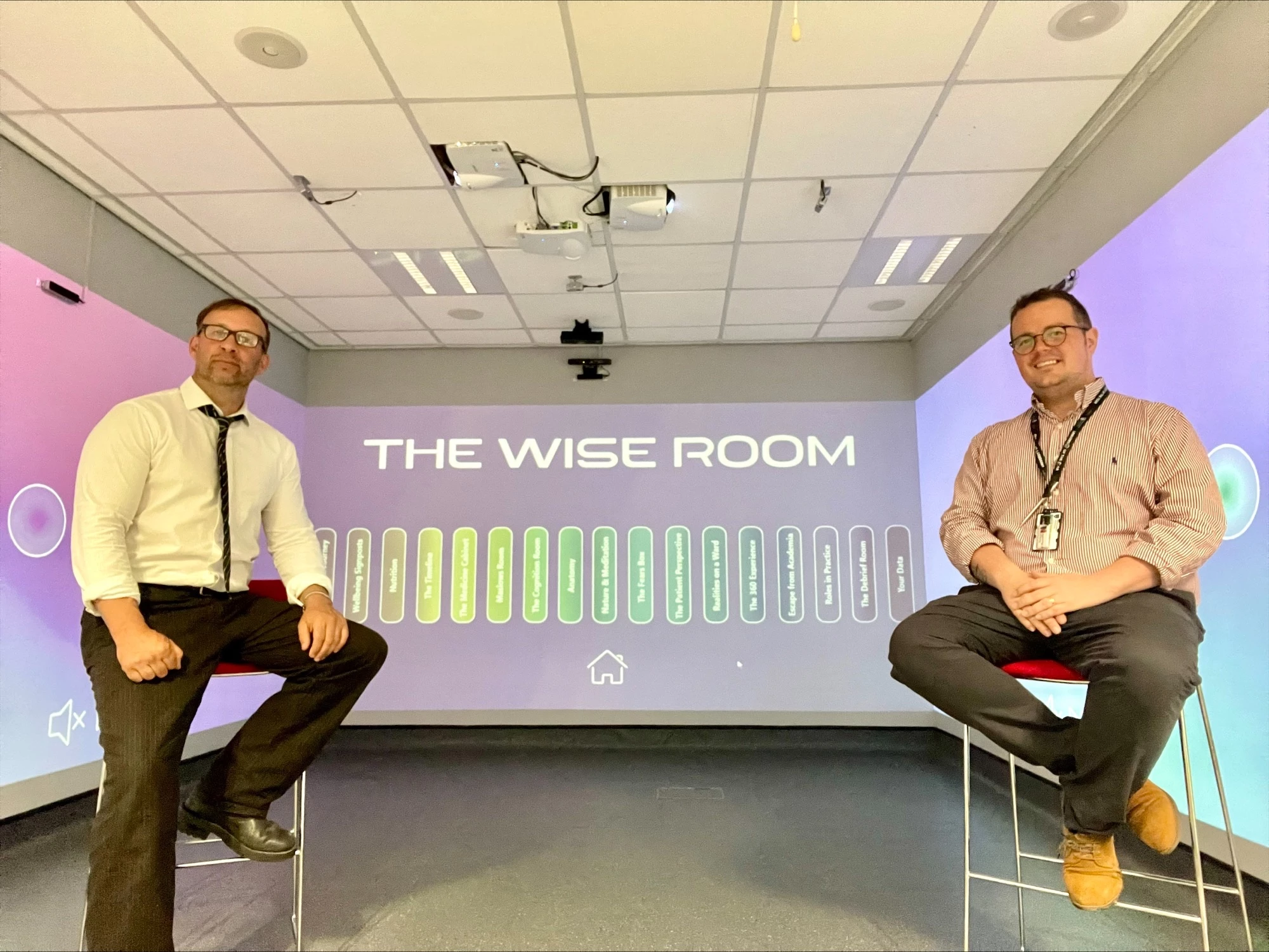
Digital environment to support student wellbeing secures NHS funding
An academic team from Northumbria University has obtained a grant of £40,000 to establish a pioneering immersive wellbeing environment for students an initiative with potential for nationwide roll-out.
The proposal was submitted by Associate Professor Barry Hill together with Dr Tor Alexander Bruce who is leading on the project, supported by principal investigator, assistant professor Dr Deborah Flynn and co-investigator, assistant professor Dominique Simpson.
The first experiential space of its kind, The Wellbeing in Student Education, or WISE Room, is already being developed to support other areas of the University and the concept behind it could eventually be rolled out in other working environments across the country.
The WISE Room contains auditory experiences, videos and images, and incorporates advanced features combining artificial intelligence (AI) with a human-centred design focus. It is also a multi-technology platform where students can interact inside it or remotely with their phones, laptops or in certain rooms via a head-mounted device.
Dr Bruce, an interdisciplinary researcher specialising in health and life sciences, human computer interaction and human-centred design, said his background of working in the charity sector was an influence in developing the new technology. “This is a novel, exciting project that has been influenced by previous practice,” he said.
“I took this forward in my PhD in the field of human computer interaction where I designed, trialled and evaluated a digital therapeutic intervention called The Timeline – effectively, a multi-sensory environment that contains still and moving image displays, as well as sounds and the ability to engage via touch.”
Dr Bruce collaborated with associate professor Hill, from the University’s Department of Nursing, Midwifery, and Health. They contemplated how they could utilise the technology to assist students who might have been considering withdrawing from their course. This is the second NHS England project, succeeding a student attrition initiative last summer, led by Associate Professor Hill and assistant professor Dr Annessa Rebair, which also secured a £40,000 grant.
“The University already offers a range of pastoral support for students and staff, but The WISE Room adds a different dimension where students can engage experientially with their surroundings,” said Dr Bruce. “This draws on theory from embodied and enactive cognition, whereby people make sense of their environment by engaging with it.”
Now the academics are exploring ways of linking the concepts behind The WISE Room to other faculties and areas of expertise across Northumbria University.
Associate professor Hill added: “Although our primary objective was to design a system to lower attrition rates among undergraduate students in our nursing, midwifery and health programmes, the initiative has now flourished into a robust, interdepartmental research project, characterised by substantial collaboration among students, staff and external partners.”
Eleanor Coleman, project manager for the Nursing and Midwifery Team in NHS England’s Workforce, Training and Education directorate, said: “We were pleased to be able to fund such a useful and innovative project at Northumbria University to support undergraduate students at risk of leaving the programme.”
By Mark Adair – Correspondent, Bdaily
- Add me on LinkedIn and Twitter to keep up to date
- And follow Bdaily on Facebook, Twitter and LinkedIn
- Submit press releases to editor@bdaily.co.uk for consideration.
Looking to promote your product/service to SME businesses in your region? Find out how Bdaily can help →
Enjoy the read? Get Bdaily delivered.
Sign up to receive our daily bulletin, sent to your inbox, for free.








 Navigating the messy middle of business growth
Navigating the messy middle of business growth
 We must make it easier to hire young people
We must make it easier to hire young people
 Why community-based care is key to NHS' future
Why community-based care is key to NHS' future
 Culture, confidence and creativity in the North East
Culture, confidence and creativity in the North East
 Putting in the groundwork to boost skills
Putting in the groundwork to boost skills
 £100,000 milestone drives forward STEM work
£100,000 milestone drives forward STEM work
 Restoring confidence for the economic road ahead
Restoring confidence for the economic road ahead
 Ready to scale? Buy-and-build offers opportunity
Ready to scale? Buy-and-build offers opportunity
 When will our regional economy grow?
When will our regional economy grow?
 Creating a thriving North East construction sector
Creating a thriving North East construction sector
 Why investors are still backing the North East
Why investors are still backing the North East
 Time to stop risking Britain’s family businesses
Time to stop risking Britain’s family businesses